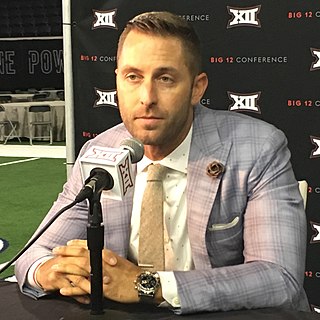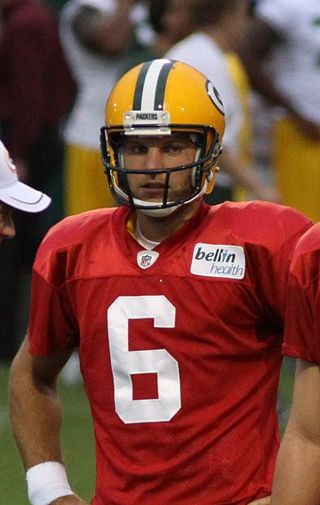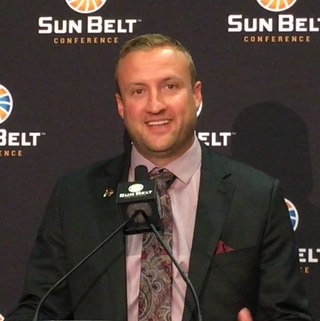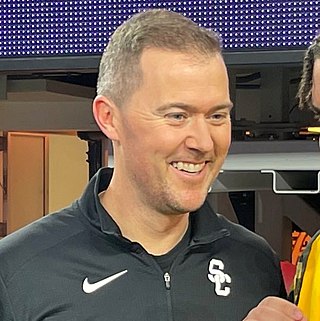Related Research Articles
Michael Charles Leach was an American college football coach who primarily coached at the NCAA Division I FBS level. He was a two-time national coach of the year, three-time conference coach of the year and the mastermind behind the NCAA record-setting air raid offense. He was the head coach at Texas Tech University from 2000 to 2009, where he became the winningest coach in school history. After Texas Tech, he coached at Washington State University from 2012 to 2019, where he recorded the third-most wins of any coach in school history. He then coached at Mississippi State University from 2020 until his death in 2022.

Kliff Timothy Kingsbury is an American football coach and former quarterback who is the offensive coordinator for the Washington Commanders of the National Football League (NFL). He played college football at Texas Tech, finishing in the top three in several school passing records before being selected in the sixth round of the 2003 NFL draft by the New England Patriots. He later played for other teams before entering coaching in 2008.
Hal Clay Mumme is a former American football coach and former player. He most recently served as an offensive advisor for the Dallas Renegades of the XFL. Previously, Mumme served as the head football coach at Iowa Wesleyan College, Valdosta State University, the University of Kentucky, Southeastern Louisiana University, New Mexico State University, McMurry University, and Belhaven University. Mumme is known for being one of the founders of the air raid offense.
Sonny Jack Cumbie is an American football coach and former quarterback. He is the head football coach at Louisiana Tech University, a position he has held since the 2022 season. Cumbie previously served as the offensive coordinator and quarterbacks coach at Texas Tech University and was the interim head coach after the departure of Matt Wells in 2021. He also served as the offensive coordinator and quarterbacks coach at Texas Christian University (TCU). Cumbie played college football at Texas Tech and was the team's starting quarterback during the 2004 season, when he led the nation in passing and total offense and a guided the Red Raiders to win in the 2004 Holiday Bowl, earning MVP honors for the game. Cumbie played professionally in the Arena Football League (AFL), the Indoor Football League (IFL), and briefly in the National Football League (NFL).

The spread offense is an offensive scheme in gridiron football that typically places the quarterback in the shotgun formation, and "spreads" the defense horizontally using three-, four-, and even five-receiver sets. Used at every level of the game including professional, college, and high school programs across the US and Canada, spread offenses often employ a no-huddle approach. Some implementations of the spread also feature wide splits between the offensive linemen.

Graham Stanton Harrell is an American football coach and former quarterback who is the offensive coordinator for the Purdue Boilermakers. He played college football for Texas Tech Red Raiders from 2004 to 2008. He played in the Canadian Football League (CFL) and the National Football League (NFL) for 5 seasons from 2009 to 2013, with his longest tenure as a player with the Green Bay Packers. He served as the offensive coordinator of the North Texas Mean Green (2016–2018), USC Trojans (2019–2021) and the West Virginia Mountaineers (2022).
Tony Franklin is an American football coach, most recently serving as the offensive coordinator for the Army Black Knights sprint football team. Previously, he held the same position with the Middle Tennessee Blue Raiders of Conference USA after making a move from the same position with the California Golden Bears. He announced his retirement from MTSU soon after the new year in 2021, following the completion of a challenging 2020 season.

Dana Carl Holgorsen is an American college football coach. He served as the head football coach at West Virginia University from 2011 to 2018 and the University of Houston from 2019 to 2023. Holgorsen has worked as an assistant coach under Hal Mumme, Mike Leach, Kevin Sumlin, and Mike Gundy.

The 2000 Texas Tech Red Raiders football team represented Texas Tech University as a member of the Big 12 Conference during the 2000 NCAA Division I-A football season. In their first season under head coach Mike Leach, the Red Raiders compiled a 7–6 record, finished in fourth place in Southern Division of the Big 12, and outscored opponents by a combined total of 330 to 278. The team played its home games at Jones SBC Stadium in Lubbock, Texas.

Daniel "Sonny" Dykes is an American football coach, and a former college baseball player. He is currently the head football coach at Texas Christian University (TCU), and previously served in the same role at Southern Methodist University (SMU) from 2018 to 2021, the University of California, Berkeley from 2013 to 2016, and Louisiana Tech University from 2010 to 2012. In his first season at TCU, he led the Horned Frogs to a win in the semifinal and an appearance in the National Championship game.
A system quarterback is an American football quarterback who flourishes under a particular offensive system, specifically one that focuses on passing. The term is often seen as a pejorative, for it implicitly downplays a quarterback's talent or skill by implying that a successful offense is due to a particular scheme or that a quarterback is successful due to his employment under specific circumstances. Russ Lande of Sporting News traced the term's etymology, or at least currency, to the early 1990s, when two University of Houston quarterbacks failed to carry college success into their professional careers. First, Andre Ware, in head coach Jack Pardee and offensive coordinator John Jenkins's run and shoot offense, had a record-setting 1989 season that culminated in a Heisman Trophy. He was the seventh overall pick in the 1990 NFL Draft, but did not have success in either the National Football League or the Canadian Football League. David Klingler took over for Ware at UH and was the sixth overall pick in the 1992 NFL Draft. He too, failed to find exceptional success in the NFL.
Eric Morris is an American football coach and former player. He is currently the head football coach at the University of North Texas. He was previously the head football coach at the University of the Incarnate Word and offensive coordinator at Washington State University.
The History of Texas Tech Red Raiders football covers 95 seasons since the team began play as the "Matadors" in 1925.

Jacob Stephen Spavital is an American college football coach who is the offensive coordinator for the Baylor Bears. He previously served as the offensive coordinator at Cal Golden Bears in 2023.

Lincoln Michael Riley is an American college football coach and former player who is the head coach of the USC Trojans football program at the University of Southern California.
Bill Bedenbaugh is an American football coach and former player. He is the current offensive line coach at the University of Oklahoma. He was the offensive line coach starting in 2013 and was promoted to co-OC prior to the 2017 season. Bedenbaugh is a spread offense offensive line coach from the Mike Leach coaching tree.
Phil Longo is an American football coach who is currently the offensive coordinator for the Wisconsin Badgers. A practitioner of the air raid offense, he was previously the offensive coordinator and quarterbacks coach for North Carolina, Ole Miss and Sam Houston.
Shannon Dawson is the offensive coordinator and quarterbacks coach at the University of Miami. Previously, he has been the offensive coordinator at Houston, Kentucky, West Virginia and Southern Miss.
Zach Kittley is an American football coach who is currently the offensive coordinator and quarterbacks coach at Texas Tech University. He previously served in the same capacity at Western Kentucky University in 2021 and Houston Baptist University from 2018 to 2020.
References
- ↑ "Wisconsin And Purdue Loom As Big Ten "Dark Fillies" As Season Nears". Princeton Daily Clarion . 22 August 1941. p. 4. Retrieved 11 April 2024.
- ↑ "2017 Hall of Fame Inductees". Iowa Wesleyan University Athletics. Retrieved April 15, 2020.
- ↑ "Hal Mumme (2016) - Hall of Fame". Valdosta State University Athletics. Retrieved April 15, 2020.
- ↑ "Kliff Kingsbury is giving us the future stat nerds want for the NFL". USA Today. 23 May 2019. Retrieved 3 August 2019.
- ↑ Gwynne, S.C. (2016-09-20). "Epilogue: The Game Changes". The Perfect Pass: American Genius and the Invention of Football. Scribner. ISBN 978-1501116193.
- ↑ Lewis, Michael (December 4, 2005). "Coach Leach Goes Deep, Very Deep". The New York Times. Retrieved September 14, 2023.(subscription required)
- ↑ Scoggins, Chip (December 30, 2006). "Insight Bowl: Historic collapse". Star Tribune . Archived from the original on December 18, 2014. Retrieved January 18, 2013.
- ↑ "Ex-Kentucky coach Mumme joins SMU's staff". go.com. 20 March 2013.